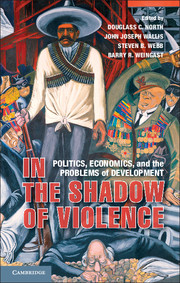Book contents
- Frontmatter
- Contents
- Contributors
- Acknowledgments
- One Limited Access Orders
- Two Bangladesh
- Three Fragile States, Elites, and Rents in the Democratic Republic of Congo (DRC)
- Four Seeking the Elusive Developmental Knife Edge
- Five Change and Continuity in a Limited Access Order
- Six India’s Vulnerable Maturity
- Seven Entrenched Insiders
- Eight From Limited Access to Open Access Order in Chile, Take Two
- Nine Transition from a Limited Access Order to an Open Access Order
- Ten Lessons
- Index
- References
Nine - Transition from a Limited Access Order to an Open Access Order
The Case of South Korea
Published online by Cambridge University Press: 05 December 2012
- Frontmatter
- Contents
- Contributors
- Acknowledgments
- One Limited Access Orders
- Two Bangladesh
- Three Fragile States, Elites, and Rents in the Democratic Republic of Congo (DRC)
- Four Seeking the Elusive Developmental Knife Edge
- Five Change and Continuity in a Limited Access Order
- Six India’s Vulnerable Maturity
- Seven Entrenched Insiders
- Eight From Limited Access to Open Access Order in Chile, Take Two
- Nine Transition from a Limited Access Order to an Open Access Order
- Ten Lessons
- Index
- References
Summary
Introduction
During the second half of the twentieth century, South Korea (Korea, hereafter) transformed itself from a poor nation into a rich and democratic country. Although Korea relied heavily on American aid while endeavoring to emerge from the ashes of the Korean War (1950–3) in the 1950s, it has become a significant donor country. Korea has demonstrated the long-term viability and strength of its economy by quickly overcoming both the Asian financial crisis of 1997 and the global financial crisis of 2008. Moreover, Korea has successfully consolidated its democracy since the democratic transition in 1987. The Korean people have made two changes of government through free and fair election, and Korea has seen no successful or attempted coup. Democracy has become the only game in town.
Many scholars have tried to explain Korea’s success story of sustained economic growth. Few have, however, examined both the economic and the political development of Korea. Mo and Weingast (2012; Mo-Weingast, hereafter) is a notable exception. They applied the framework of transition from a limited access order (LAO) to an open access order (OAO) developed by North, Wallis, and Weingast (2009; NWW, hereafter) and North, Wallis, Webb, and Weingast (2007; NWWW, hereafter). As NWW and Mo-Weingast indicated, Korea is one of the three countries outside of Europe and the Anglo-American countries (Australia, Canada, New Zealand, and the United States) that have completed (Japan) or moved far along the transition to an open access order (Korea and Taiwan).
- Type
- Chapter
- Information
- In the Shadow of ViolencePolitics, Economics, and the Problems of Development, pp. 293 - 327Publisher: Cambridge University PressPrint publication year: 2012
References
- 9
- Cited by



